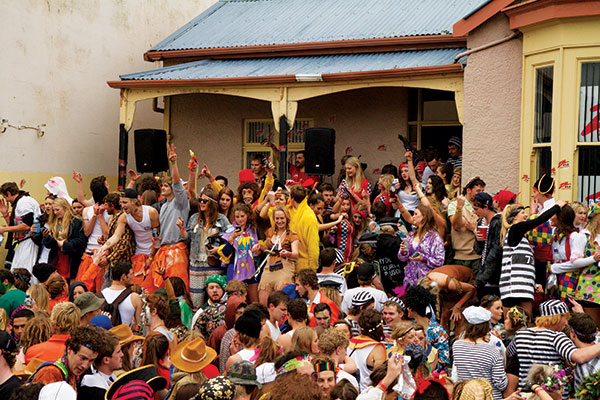The Real Cost of Hyde
Councillor Says Hyde is a Slum Full of Pigs
Last week, The Wireless published an article quoting Dunedin Mayor Dave Cull stating, “The public resource that goes into that one day is about $125,000.” Cull said this ballpark figure was given by a Southland District Health Board member during a tertiary sector group meeting. The meeting involved Otago University, Otago Polytechnic, the Dunedin City Council, the Dunedin Police and Public Health South. Regarding the figure, Cull told The Wireless, “We need to start thinking about whether that’s the best use of taxpayer money.”
Reid could not be reached to confirm this figure, though Dunedin City Councillor David Benson-Pope said the cost is “in terms of staff time and [work on the event] before, during and after.” Benson-Pope, who is openly opposed to Hyde Street in general, said the party costs the city “well over $100,000.”
Benson-Pope said Hyde Street is “an embarrassment.” He added, “I am embarrassed as a Dunedin resident to have a slum like that in the middle of the town … if you give people pigsties to live in, do not be surprised if they act like pigs.”
When questioned about the party specifically, he said, “I’m not against people having a good time, and if they want to do it in the street that is fine, provided it’s safe.”
According to OUSA President Paul Hunt, OUSA spends $22,000 on health and safety. Being the main organisers of the event since 2013, OUSA pays for most of the direct costs associated with the party. Hunt said 45% of the cost is spent on security; 27% on traffic management, infrastructure and fencing; 30% for the St. John Ambulance Service; and 8% on food.
“The cost to the taxpayer would be the cost of having the police at Hyde Street, but it’s not uncommon for the police to be at events,” said Hunt. “Other taxpayer costs would be Dunedin Hospital and healthcare facilities.”
OUSA figures from Hyde Street 2014 show that there were one third less arrests than 2013, 45% less casualties treated by St Johns, and 50% less total cases seen.
The party has come under threat in recent years due to the continuing debate between councillors, police and residents regarding a North Dunedin liquor ban. There have been calls for Hyde Street to be scrapped altogether. Cull stated: “It was getting to a point where [the DCC was] worried someone was going to get badly injured or killed.” This said, Cull praised OUSA and the university on the “fantastic job [they have done] making [the Hyde Street Keg Party] safer and more acceptable in the last few years.”
Asked whether he believes the event should continue in the future, Cull said, “You do have to ask about the normalisation of very large street parties with very large intakes of alcohol.”
Dunedin North MP David Clark said as a solution that “those costs be sheeted back to those who generate them, and often that sorts out problems.” Benson-Pope also suggested “the people who should be paying for [the clean up] are the people who are making the mess, not ratepayers.”
Dunedin Police have issued a media release stating: “OUSA [has always] done a great job in assisting the residents of Hyde St to organise this event. We encourage those attending to enjoy themselves within the bounds of the law and to keep themselves safe and look after their friends. We’d also like to take this opportunity to remind students who are attending the party to ensure that their flats are secured while they are at the party. Over the last two years there has been an increase in burglaries in the Hyde Street area while the party is on.”







